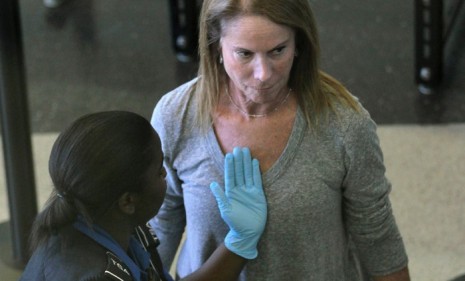Fixing airport security: 4 proposals
With air travelers furious over the TSA's "enhanced" security procedures, new ideas are being floated — from arming passengers to adopting the Israeli system

A free daily email with the biggest news stories of the day – and the best features from TheWeek.com
You are now subscribed
Your newsletter sign-up was successful
The TSA's new airport security rules have stirred up a hornet's nest of complaints about invasive "enhanced" pat-downs and "naked" full-body scanners. The TSA is making small modifications to the rules, but many commentators and air passengers are calling for bigger changes. Here are four proposed ways to revamp airport security while still keeping air travel safe — and why those ideas may not work:
1. Distort the "naked" scan images
People are choosing the pat-downs to avoid having a TSA agent see them essentially naked, so "why not just distort the image into something grotesque so that there isn't anything titillating or exciting about it?" asks former nuclear weapons designer Bill Wattenburg, who designed a program to do just that in 2006 when he was working at the Lawrence Livermore National Laboratory. Wattenburg says his fun house-mirror proposal, which he offered to the TSA, would still allow screeners to see bombs and other weapons, just not passengers' "junk."
The Week
Escape your echo chamber. Get the facts behind the news, plus analysis from multiple perspectives.

Sign up for The Week's Free Newsletters
From our morning news briefing to a weekly Good News Newsletter, get the best of The Week delivered directly to your inbox.
From our morning news briefing to a weekly Good News Newsletter, get the best of The Week delivered directly to your inbox.
Downside: The only way to check that Wattenburg's system would "catch" weapons and explosives is "extensive field testing," says Alexis Madrigal in The Atlantic, which is unlikely to happen. Also, distorting the image doesn't address other concerns about the scanners' safety and effectiveness.
2. Give the TSA private competitors
The problem is the TSA itself, says Ray Davis in Business Lexington. Why have a "mammoth bureaucracy" screen passengers and luggage when competing private companies, hired by airlines, can do it more flexibly, cheaply, and safely. Airlines, after all, "have the most to gain from making sure their own aircraft are safe." If you open this up to private enterprise, suggests Allahpundit at Hot Air, people could choose whether to fly on "safe," "average," or "risky" airlines. "I'd love to see [that] happen," in part to watch how many of today's complainers "would choose to fly Risk Air."
Downside: "Airport security was private, you may recall, before the 9/11 attacks," says USA Today in an editorial, and it wasn't efficient. The reality was: High turnover, higher costs, corner-cutting, and security as tight as a "sieve."
A free daily email with the biggest news stories of the day – and the best features from TheWeek.com
3. Set up a volunteer air militia
The TSA hasn't prevented any of the attempted attacks since 9/11, says Denis Keohane in The American Thinker. Passengers have. So we should ditch the TSA's "increasingly absurd steps" to keep weapons off planes, and encourage a deputized force of "volunteer counter-terrorists" to carry weapons on flights.
Downside: I hate the new scanners and the pat-downs, says Tim Heffernan in Esquire, but "knives and guns are inherently dangerous, even in the hands of the sane and law-abiding... I'd rather have no weapons aboard at all than place my and everyone else's safety in the hands of a potential hero."
4. Profile travelers the way Israel does
"The 99 percent of American airline passengers who do not raise meaningful red flags should not be subjected to such invasive inspections," says Mark Hyman in The American Spectator. Yet, thanks to political correctness and perverse rules, TSA inspectors end up "humiliating elderly widows or terrorizing toddlers." The U.S. should copy Israel's airports, which maintain great security records without wasting time giving "the third degree to a Danish school teacher on holiday for every Palestinian they further scrutinize."
Downside: "The Israeli system is only convenient for Israeli Jews," says Kevin Drum in Mother Jones. "It's a huge pain in the ass for everyone else," and it couldn't be scaled up to work in the U.S. Also, "terrorists, tragically, aren't fools," says The New York Times in an editorial, and they'd find the right profile for a bomber to get through such a system.
-
 Political cartoons for February 16
Political cartoons for February 16Cartoons Monday’s political cartoons include President's Day, a valentine from the Epstein files, and more
-
 Regent Hong Kong: a tranquil haven with a prime waterfront spot
Regent Hong Kong: a tranquil haven with a prime waterfront spotThe Week Recommends The trendy hotel recently underwent an extensive two-year revamp
-
 The problem with diagnosing profound autism
The problem with diagnosing profound autismThe Explainer Experts are reconsidering the idea of autism as a spectrum, which could impact diagnoses and policy making for the condition